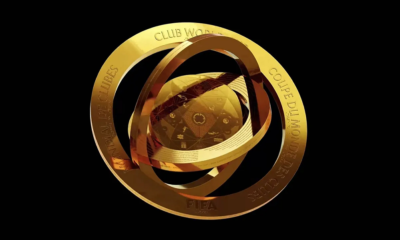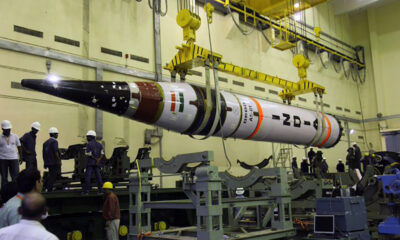Science & Technology
Russia tests nuclear-capable missile that Putin calls world’s best
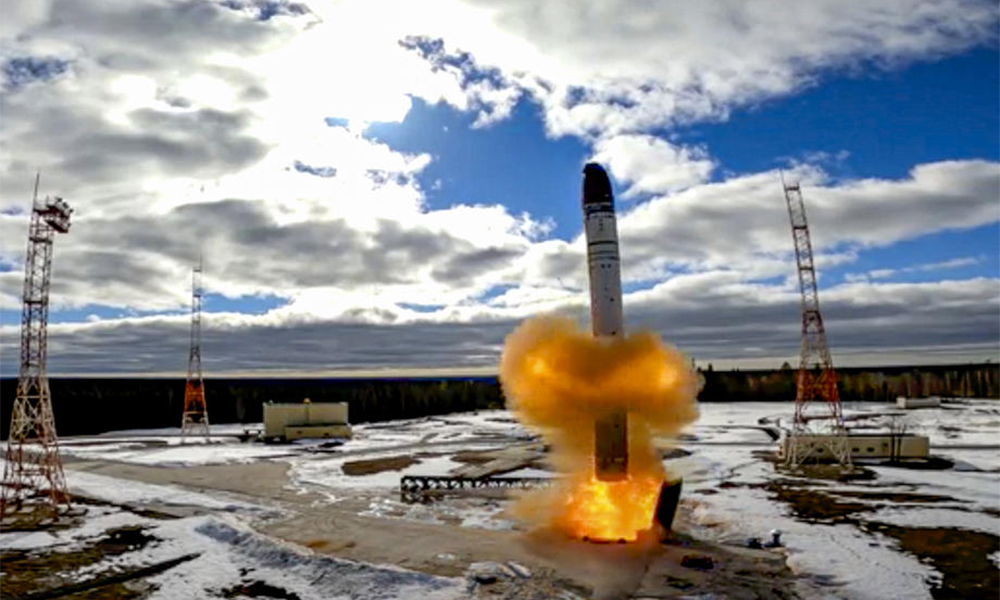
In a show of strength two months into its assault on Ukraine, Russia test-launched a new nuclear-capable intercontinental ballistic missile which President Vladimir Putin said on Wednesday would make Moscow's enemies stop and think.
Putin was shown on TV being told by the military that the long-awaited Sarmat missile had been test-launched for the first time from Plesetsk in northwest Russia and hit targets in the Kamchatka peninsula, nearly 6,000 km away, Reuters reported.
The test of the Sarmat, under development for years, did not surprise the West, but came at a moment of extreme geopolitical tension. Russia has yet to capture any major cities since it sent tens of thousands of troops into Ukraine on February 24.
Ukraine's defence ministry was not immediately available for comment.
"The new complex has the highest tactical and technical characteristics and is capable of overcoming all modern means of anti-missile defence. It has no analogues in the world and won't have for a long time to come," Putin said.
"This truly unique weapon will strengthen the combat potential of our armed forces, reliably ensure Russia's security from external threats and provide food for thought for those who, in the heat of frenzied aggressive rhetoric, try to threaten our country."
Announcing the invasion eight weeks ago, Putin made a pointed reference to Russia's nuclear forces and warned the West that any attempt to get in its way "will lead you to such consequences that you have never encountered in your history."
Days later, he ordered Russia's nuclear forces to be put on high alert. "The prospect of nuclear conflict, once unthinkable, is now back within the realm of possibility," United Nations Secretary-General Antonio Guterres said last month.
Russia's defence ministry said on Wednesday the Sarmat was fired from a silo launcher at 1512 Moscow time (1212 GMT).
Russia's nuclear forces will start taking delivery of the new missile "in the autumn of this year" once testing is complete, Tass quoted Dmitry Rogozin, head of the Roscosmos space agency, as saying on Wednesday, Reuters reported.
Science & Technology
Russia fines Google more than the world’s total GDP over YouTube bans

Russia has fined Google $2.5 decillion after the US tech giant took action against pro-Kremlin TV channels on YouTube following Moscow’s invasion of Ukraine.
Russia imposed a daily fine four years ago - a fine that has since swelled to an unprecedented level - ($20,000,000,000,000,000,000,000,000,000,000,000 - a 33-digit figure).
To put this into perspective, global GDP reaches an estimated $110 thousand billion (12-digit figure), according to the IMF.
Speaking to Russia’s TASS news agency, one expert, Roman Yankovsky from the HSE Institute of Education, said Google “clearly will not pay this penalty, and the Russian Federation will not be able to recover this money from the company."
Euronews reported that a short calculation shows that he is right.
Google's holding company, Alphabet, has a market capitalisation of slightly more than $2 trillion. Even with earnings of $80.54 billion from the last quarter, the tech giant doesn’t seem to be able to afford to pay the fine.
Google first barred pro-Moscow channel Tsargrad TV, which is owned by oligarch Konstantin Malofeev, four years ago.
At the time, Google was fined a daily penalty of 100,000 roubles and warned that amount would double every 24 hours if it went unpaid.
The original fine has been compounded by further penalties after Google eventually blocked a total of 17 Russian TV channels as a result of international sanctions, The Telegraph reported.
The tech giant now owes a staggering $2.5 decillion.
Science & Technology
Apple launches new iPad mini with AI features
Apple said it would roll out the first set of AI features in the U.S. version of the English language this month through a software update with iPadOS 18.1.

Apple on Tuesday launched its new generation of the iPad mini packed with AI features including writing tools and an improved Siri assistant, as the iPhone maker races to boost its devices with artificial-intelligence capabilities, Reuters reported.
The new iPad mini is powered by Apple's A17 Pro chip, which is used in the iPhone 15 Pro and Pro Max models. With a six-core central processing unit, the A17 Pro would boost CPU performance by 30% compared to the current generation iPad minis and is central to running Apple Intelligence, Apple's AI software.
Apple said it would roll out the first set of AI features in the U.S. version of the English language this month through a software update with iPadOS 18.1.
The features will be available for iPads with A17 Pro or M1 chips and later generations, Apple said, adding it will roll out additional features including image-generation tools, Genmoji and ChatGPT-powered capabilities over the next several months, read the report.
Apple in September unveiled its long-awaited, AI-boosted iPhone 16 lineup, but with the AI features still in test mode, the company failed to excite some investors while early sales data raised some questions around demand.
Still, research firm Canalys on Monday said the iPhone 16 would help Apple's sales in the fourth quarter and drive momentum into the first half of 2025, after Apple reached a record high third-quarter shipments.
The iPad mini, starting at $499, is available for pre-orders starting on Tuesday and will begin arriving to customers and Apple store locations next week, Apple said.
Science & Technology
Iran sends satellites to Russia for rocket launch
In September, Iran carried out its second satellite launch this year using a rocket built by its Revolutionary Guards
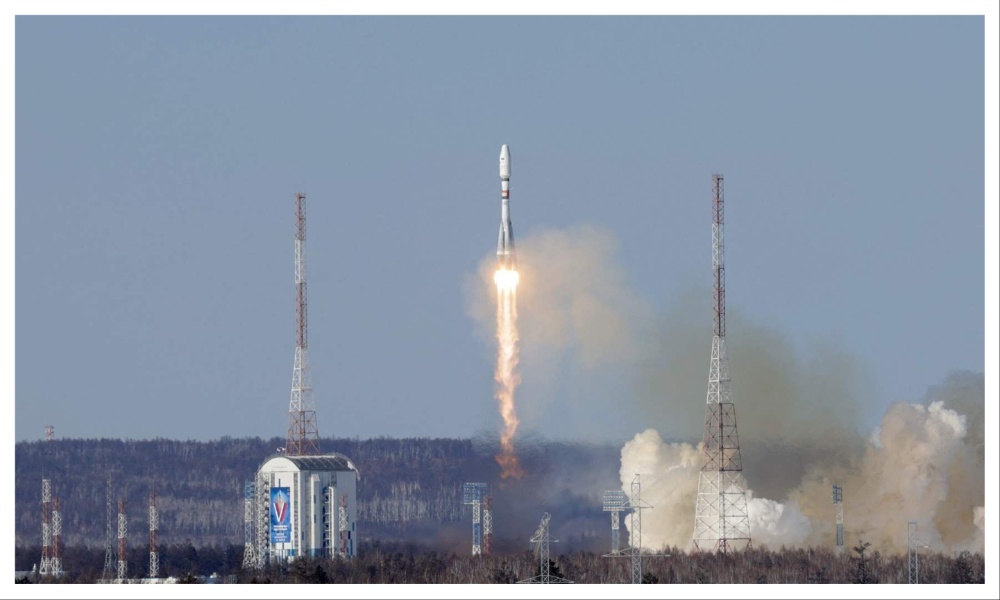
Iran has sent two locally made satellites to Russia to be put into orbit by a Russian space vehicle, the semi-official news agency Tasnim reported on Saturday, in the latest space cooperation between the two U.S.-sanctioned countries.
The development of Kowsar, a high-resolution imaging satellite, and Hodhod, a small communications satellite, is the first substantial effort by Iran's private space sector, the report said.
Russia sent Iranian satellites into orbit in February and in 2022, when U.S. officials voiced concern over space cooperation between Russia and Iran, fearing the satellite will not only help Russia in Ukraine but also help Iran monitor potential military targets in Israel and the wider Middle East, Reuters reported.
Kowsar could be used in agriculture, natural resource management, environmental monitoring, and disaster management, Tasnim said.
Hodhod is designed for satellite-based communications and could be used in remote areas with little access to terrestrial networks.
In September, Iran carried out its second satellite launch, this year using a rocket built by its Revolutionary Guards.
The launch came as the United States and European countries accuse Tehran of transferring ballistic missiles to Russia that could be used in its war with Ukraine. Iran has denied this.
-

 World5 days ago
World5 days agoBiden is sending aid to help Ukraine keep fighting next year, Blinken says
-
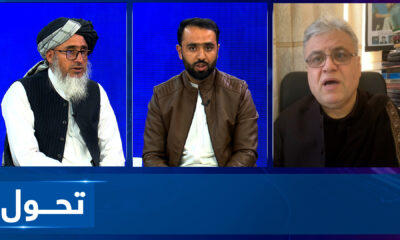
 Tahawol4 days ago
Tahawol4 days agoTahawol: NATO’s concern over proximity of Russia & North Korea discussed
-

 Latest News4 days ago
Latest News4 days agoIEA committed to freedom of media within Islamic principles: Mujahid
-

 Latest News5 days ago
Latest News5 days agoIEA prioritizing poverty reduction and job opportunities, says deputy PM
-

 5 days ago
5 days agoAWCC customer in Kandahar wins 1 million AFN in ‘lucky lottery’
-
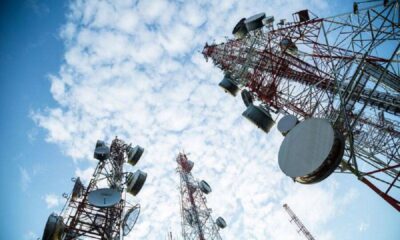
 Latest News5 days ago
Latest News5 days agoIEA cuts mobile phone and internet rates
-

 Latest News4 days ago
Latest News4 days agoKhalilzad: Turning our back on Afghanistan would not be wise
-
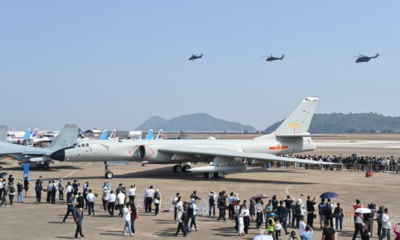
 World5 days ago
World5 days agoChina’s largest air show off to flying start with fighter jets and attack drones


